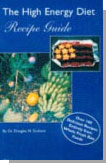| 
How can I lose weight when every time I go on a diet,
I'm so exhausted I can barely make it through the day? So
goes the complaint of many men and women who are concerned
about being overweight.
What many people don't realize is that a healthful weight-loss
plan can actually boost your energy. The key is to eat smart.
And then combine this healthful diet with some physical
activity. Here are six pointers to get you started.
Get enough calories.
Consume too few calories and you'll have less energy, and
decrease the amount of calories burned. "That's because
one of the ways the body protects itself from starvation
is to slow down its metabolism," explains Dr. Donald
Hensrud, a nutrition
professor at the Mayo Clinic, in Rochester, Minn.
So how many calories do you need to feel energized while
also slimming down? A healthful weight-loss rate is roughly
one-and-a-half pounds per week, and the calorie intake to
achieve this depends on your age, weight, and activity level.
Eat a balanced, varied diet. The key
to keeping your energy level up when you diet is to eat
balanced meals that supply all the nutrients you need. "Vitamins
and minerals act like spark plugs," explains Kristine
Clark, director of sports nutrition at Pennsylvania State
University. "They help release the energy in nutrient-rich
foods."
Try to follow USDA guidelines. They call for 6 to 11
servings per day from the bread, cereal, rice, and pasta
group; three to five servings of vegetables; two to four
of fruits; two or three of milk or cheese; two or three
of meat, fish, or eggs. Avoid fried and creamy dishes, and
keep consumption of sweets and desserts to a minimum. 
Spread your calories
throughout the day. When you go for five to six
hours without food, the amount of fuel in your system starts
to run low, and you begin to feel tired. Therefore, says
Kristine Clark, it's important to eat at regular intervals
to keep your energy up. If you exercise, it's important
to make sure you have "fuel in the tank" before
you head for the gym.
Avoid eating a large number of calories at one time,
since it's harder to control your total calorie intake,
making weight gain more likely.
Get adequate iron. About 10% of women
of childbearing age in the United States are iron deficient.
Iron is essential for energy and endurance because it is a vital component
of red blood cells, which carry oxygen to working muscles.
for energy and endurance because it is a vital component
of red blood cells, which carry oxygen to working muscles.
"Fatigue and listlessness can be directly associated
with too little iron," says Frances Berg, a licensed
nutritionist in Hettinger, N.D. The best sources of iron
are meat, poultry, and some fish. Other sources: fortified
cereals, dried beans, dried fruits, and peas.
Keep yourself hydrated. Dehydration
is often a cause of fatigue. Nutritionists recommend drinking
8 to 12 glasses of water throughout the day. (You can count
low-fat milk and low-calorie juice drinks toward meeting
this goal.)
Drink before, during, and at the conclusion of exercise.
And be aware that alcoholic beverages contain lots of calories
and few nutrients, and excess amounts can lead to dehydration.
A little exercise goes a long way. "I
don't have the energy to exercise!" say many dieters.
Indeed, a 1998 survey, developed in part by the Center for
Sports Medicine at Penn State, found that over 70% of respondents
cited "too tired" or "lack of energy"
as key reasons to skip exercising. Yet exercise is exactly
what these people need.
And, lastly, don't try to do too much too soon. Consider
breaking your exercise into small units. Instead of trying
to do 30 minutes in one chunk,
accumulate exercise in short bouts every day by mowing the
lawn, walking to work, or climbing stairs instead of taking
an elevator.
It won't be long before you reap
the rewards. Imagine carrying a 15-pound sack of groceries
around all day. Then think about how much more energy you'd
have if you put that sack down.
↑TOP (667
words)
|